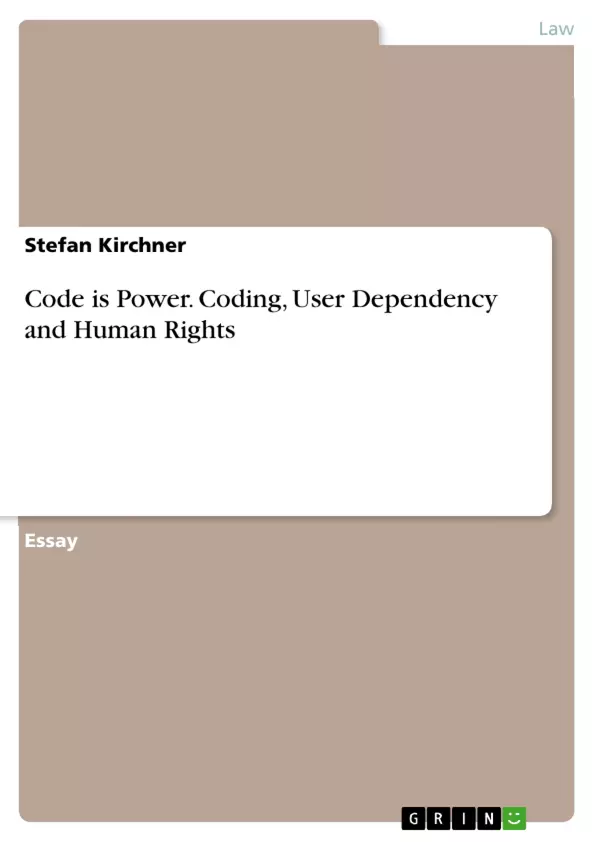It has been said by Lawrence Lessing that “code is law”. This is true already in a society which is dependent on information technology. Even though machines are not full members of this society yet, we already entrust a number of very personal and important functions to them.
In many cases, this trust goes beyond the trust parents would give a small child, who also is a member of society but does not have the right to vote yet. If you step on an airplane you trust your life to the machine and if you take your child with you, you give more trust to a machine you have never seen, and most likely might not even understand, than you would give to most other humans (i.e., strangers), let alone almost all animals.
In this sense, our society is mainly a human-machine hybrid society, with both terms being used fairly widely. In a world which depends on machines behaving in specific ways, the power to code means the power to control a large part of the human-machine hybrid society. Coders often have a degree of direct power governments or lawmakers can only dream of.
Inhaltsverzeichnis (Table of Contents)
- Code is Power: Coding, User Dependency and Human Rights
- Power of Coders
- The Power to Control
- Privacy is Not a Given
- The Duty of Nation States
- The Current Legal System
- Sources
Zielsetzung und Themenschwerpunkte (Objectives and Key Themes)
This paper explores the power dynamics created by coding in a society increasingly reliant on technology. It argues that while coding can be used to improve human lives, it also represents a form of power that needs to be limited to protect human rights and democracy.
- The growing power of coders in a technology-dependent society
- The need to regulate coding power to protect human rights and democracy
- The implications of coding for privacy, freedom of expression, and individual autonomy
- The inadequacy of current legal systems in addressing the power imbalance between coders and users
- The importance of international law in regulating globalized coding power
Zusammenfassung der Kapitel (Chapter Summaries)
- Code is Power: Coding, User Dependency and Human Rights: This chapter introduces the concept of "code as law" and argues that the power to code in a technology-dependent society is comparable to political power. It discusses the increasing reliance on machines and the growing influence of coders on our lives.
- Power of Coders: This chapter elaborates on the power of coders and its potential for abuse. It argues that coding is not inherently benevolent and can be used to erode privacy and manipulate user behavior.
- The Power to Control: This chapter provides examples of how coding can be used to control users' lives, from tracking financial transactions to influencing health decisions. It explores the implications of such control for personal freedom and autonomy.
- Privacy is Not a Given: This chapter examines the erosion of privacy in a digital age. It highlights the potential for coding to be used to collect personal data, track user behavior, and influence decisions without explicit consent.
Schlüsselwörter (Keywords)
The main keywords and focus topics of this paper are: code as law, user dependency, human rights, privacy, freedom of expression, digital technology, power dynamics, regulation of coding, international law, nation states, legal systems.
Frequently Asked Questions
What does the phrase "Code is Law" mean?
Coined by Lawrence Lessig, it suggests that the software code governing digital spaces has the same power to regulate behavior as legal statutes in the physical world.
How do coders influence human rights?
Coders design systems that can either protect or erode privacy, freedom of expression, and autonomy, often exerting power without democratic oversight.
Why is user dependency on technology a power issue?
As society depends on machines for critical functions (finance, health, travel), those who control the code gain immense direct power over individuals' lives.
Are current legal systems sufficient for regulating code?
The essay argues that current laws are inadequate to address the globalized power of coders and the resulting power imbalance between developers and users.
What is the duty of nation states regarding digital power?
Nation states have a duty to regulate coding power to ensure it aligns with human rights standards and protects democratic values from algorithmic manipulation.
- Quote paper
- Stefan Kirchner (Author), 2015, Code is Power. Coding, User Dependency and Human Rights, Munich, GRIN Verlag, https://www.grin.com/document/313132



